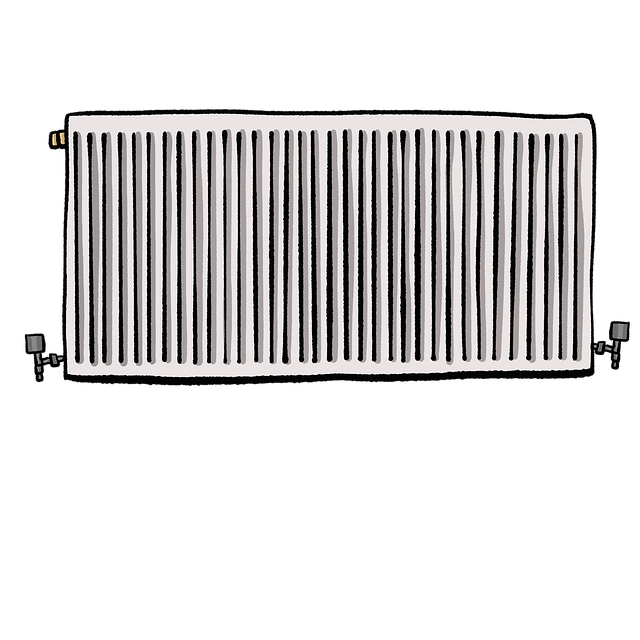Prioritize energy efficiency in central heating installations for financial and environmental benefits. Opt for high SPF appliances, smart thermostats, and zone control systems. Choose efficient systems like heat pumps and condensing boilers, reducing CO2 emissions. Consider budget, space, and fuel types while comparing options from reputable sources. Ensure proper installation, regular maintenance, and efficient systems for long-term savings and comfort.
Choosing an energy-efficient central heating system is a smart step towards reducing energy bills and environmental impact. This comprehensive guide navigates you through the process, from understanding energy efficiency in heating systems to exploring types like heat pumps and condensing boilers. We delve into critical selection factors and offer installation and maintenance tips for optimal performance. By following these insights, you’ll make an informed decision regarding your central heating installation while promoting sustainable living.
- Understanding Energy Efficiency in Heating Systems
- Types of Energy-Efficient Central Heating Options
- Factors to Consider for Optimal Selection
- Installation and Maintenance Tips for Savings
Understanding Energy Efficiency in Heating Systems

Understanding Energy Efficiency in Heating Systems
When considering a central heating installation, energy efficiency should be your top priority. This is because efficient heating systems not only save money on your energy bills but also contribute to reducing your carbon footprint. Look for appliances with high Seasonal Performance Factor (SPF) ratings, which indicate how efficiently the system converts fuel into heat over an entire heating season. Modern, high-efficiency models can provide up to 95% efficiency, significantly reducing energy waste compared to older systems.
Additionally, consider the coverage area and distribution of heat within your home. Efficient central heating installations often incorporate smart thermostats and zone control systems that allow you to precisely manage warmth in different parts of your house. This ensures that no energy is wasted heating unoccupied rooms, making your system even more cost-effective and environmentally friendly. By finding an efficient system tailored to your home’s specific needs, you can enjoy optimal comfort while minimizing resource consumption.
Types of Energy-Efficient Central Heating Options

When considering a central heating installation, there are several energy-efficient options available that can help reduce your energy bills and minimise environmental impact. One popular choice is environmentally friendly central heating systems such as heat pumps, which use renewable energy from the air or ground to warm your home efficiently. These systems are particularly effective in well-insulated homes, significantly lowering fuel consumption compared to traditional oil-based systems.
Another option to explore is condensing boilers, which recover heat that would otherwise be lost during combustion. This technology is highly efficient and can reduce CO2 emissions by up to 70% compared to conventional models. Additionally, modern smart thermostats offer precise temperature control through insulated steps, allowing you to tailor heating to your daily routine and save energy accordingly. These advanced systems are transforming the way we heat our homes, making it easier than ever to adopt sustainable practices.
Factors to Consider for Optimal Selection

When choosing an energy-efficient central heating system, several key factors come into play for an optimal selection. Firstly, consider the central heating installation cost and its compatibility with your budget. While initial expenses can vary greatly depending on the technology and size of the system, long-term savings from reduced energy bills often offset these costs. Secondly, evaluate the space you have available for the installation. Different systems have varying requirements; some may need ample room for radiators or heat exchangers, while others are more compact and suitable for smaller spaces.
Additionally, focus on the system’s efficiency ratings, such as those provided by Energy Star or similar programs. High-efficiency models consume less energy to heat your space, reducing both utility costs and environmental impact. Remember to consider fuel types too; oil boilers, for instance, offer consistent heat but may be less efficient than modern electric or gas alternatives. Balancing these factors will ensure a well-informed decision for a more sustainable and cost-effective central heating installation.
Installation and Maintenance Tips for Savings

When considering a new central heating system, proper installation is key to maximizing energy efficiency and long-term savings. Ensure that the installer follows best practices, such as ensuring a tight seal around ducts and pipes to minimize air leaks. Regular maintenance also plays a vital role; cleaning or replacing filters according to the manufacturer’s recommendations can significantly improve airflow and reduce energy consumption.
In terms of the process, schedule annual check-ups to verify system performance and make adjustments as needed. Additionally, look for systems with an Energy Star rating or similar warranty, which guarantees efficiency levels and offers protection against potential issues. Remember that a well-maintained, modern central heating system can substantially decrease energy bills and contribute to a more comfortable house year-round.
When selecting an energy-efficient central heating system, understanding your specific needs and considering various factors is key. By choosing from modern, eco-friendly options available and ensuring proper installation and maintenance, you can significantly reduce energy consumption and lower heating costs. Remember, a well-selected and maintained central heating system is not just an investment in comfort but also in long-term sustainability. For expert advice on the best central heating installation for your home, consult professionals who can guide you through the process and ensure optimal performance.
